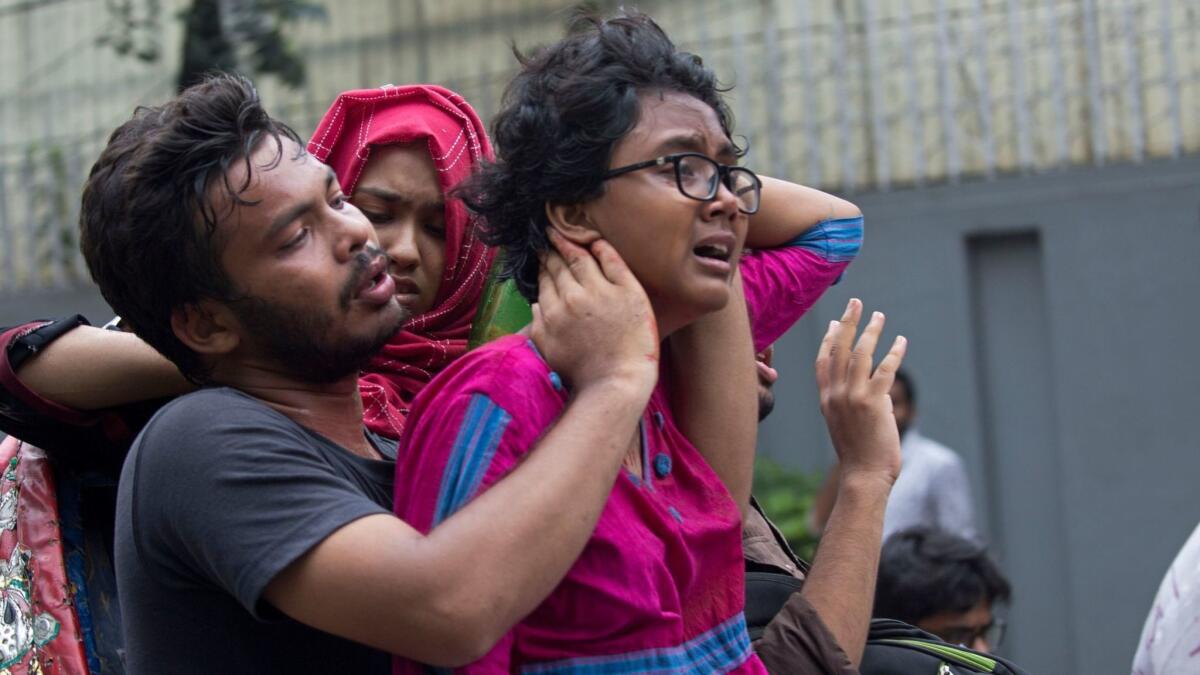Bangladesh spars with U.S. Embassy over students’ road safety protests

Reporting from Amdhaka, Bangladesh — Bangladesh’s information minister accused the U.S. Embassy on Tuesday of “poking its nose” into the country’s domestic affairs, as he responded to a Facebook post that criticized authorities’ heavy-handed response to road safety protests by students.
The minister’s rebuke marked the latest shot in Bangladesh’s increasingly fraught relations with the United States. It came as the government faced embarrassing, but now ebbing, student protests in Dhaka.
Speaking to reporters in his office Tuesday, Information Minister Hasanul Haq Inu said: “By issuing this statement [on Facebook], the U.S. Embassy took an ill attempt of poking [its] nose in Bangladesh’s internal politics in an indecent way. We condemn this.”
In huge protests over the past week, tens of thousands of university students and schoolchildren brought the world’s attention to Bangladeshi authorities’ lax enforcement of road rules after two students were hit by a speeding bus.
They blocked roads and checked drivers’ licenses to highlight how poorly traffic rules are enforced. Adding to the government’s embarrassment over the protests, among those caught breaking rules were government ministers. In one instance, protesters asked a minister to walk to his destination because his driver was not carrying a valid license. Another minister’s car was turned back for driving against the flow of traffic on a busy road.
But over the weekend, the initially peaceful protests turned violent, and police fired rubber bullets and tear gas at crowds.
The embassy’s Facebook post on Sunday afternoon noted that some students were involved in violence, but the message was directed primarily against the police use of force against students.
“Nothing can justify the brutal attacks and violence over the weekend against the thousands of young people who have been peacefully exercising their democratic rights in supporting a safer Bangladesh,” it read.
In recent months, the U.S. ambassador to Bangladesh, Marcia Bernicat, has castigated Bangladesh’s slide toward increasingly authoritarian rule. Bernicat has made public comments expressing concern over reports of intimidation and ballot-stuffing in a recent mayoral election — reports that the government denies. She also has criticized the large number of police killings during drug raids, which the government deems necessary to rid the country of addiction.
Bernicat’s frankness has reportedly irked Bangladesh’s top brass. On July 2, Prime Minister Sheikh Hasina’s son, who is also a government advisor, accused the ambassador of being a “mouthpiece” of the opposition Bangladesh Nationalist Party. On Saturday evening, on her way home from a dinner party, Bernicat’s motorcade was attacked by unidentified armed men. Investigators are still looking into the attackers’ motives.
On Monday, the government adopted tougher penalties for reckless drivers, promising to introduce the death penalty for deliberate road deaths.
But the apparent concession came with warnings: Police arrested a prominent photographer who criticized the government on television.
By Tuesday morning, an eerie calm had replaced the festive commotion of the protests in Dhaka.
Many students stayed off the streets, fearing further violence and reprisals, as parents warned them to stay indoors.
But many also celebrated what the protests have achieved.
“It’s good to see people have become more aware of our traffic rules after our protests,” said Rabbi Hasan, a student at Dhaka’s Government Laboratory College.
Mir Rezaul Alam, who oversees Dhaka’s traffic police, reported a surge in cases filed against rule breakers. “Yesterday, we filed about 8,500 cases, when the average case was 3,000 in the past. We are strictly enforcing the law, and people are cooperating,” he said.
For some, the protests offered a glimpse of a brighter future for this crowded capital region, home to more than 18 million people.
“The protests showed ... what should be done, what the government should do, what the people should do,” said Ilias Kanchon, a Bangladeshi movie star and advocate for road safety. “You can see a result already today in Dhaka. The number of vehicles is very limited today. The reason is that no one is taking their car out without having the proper document or proper license for their driver.”
Others felt disillusioned that the protests became political, increasingly attacking the ruling Awami League party and drifting from the issue of road safety.
At first, “I thought it was my moral duty” to protest, said Sharif Adnan, a student at Dhaka University. “But I did not join the protest later when I felt it was being politicized. Due to this politicization, an ethical protest literally failed.”
Doshi reported from New Delhi.
More to Read
Sign up for Essential California
The most important California stories and recommendations in your inbox every morning.
You may occasionally receive promotional content from the Los Angeles Times.










